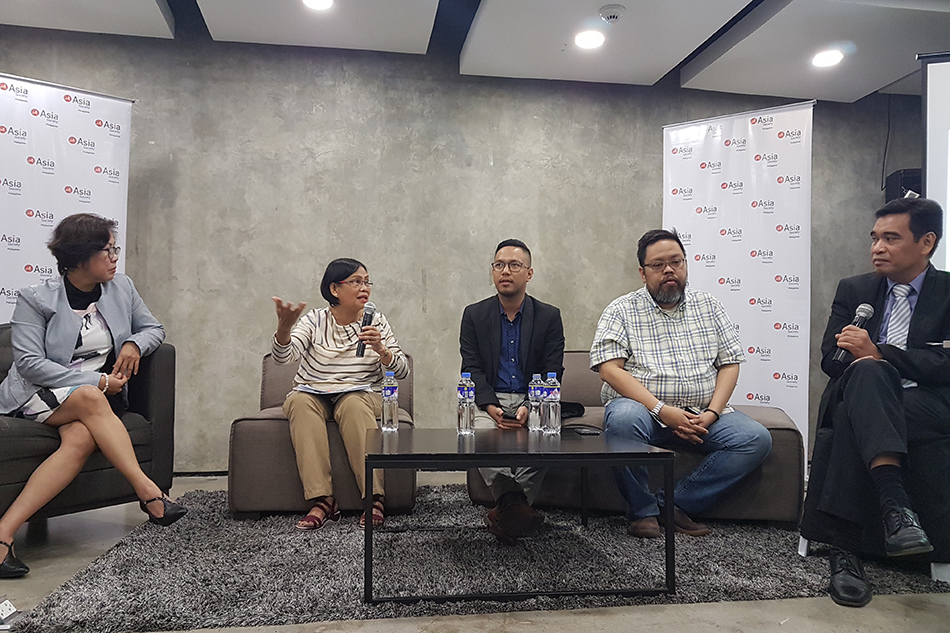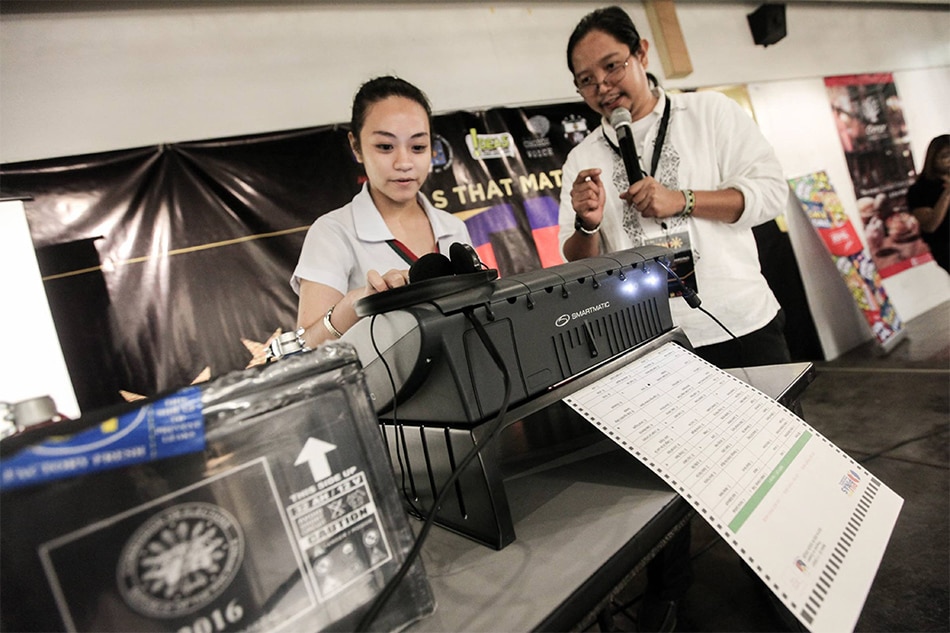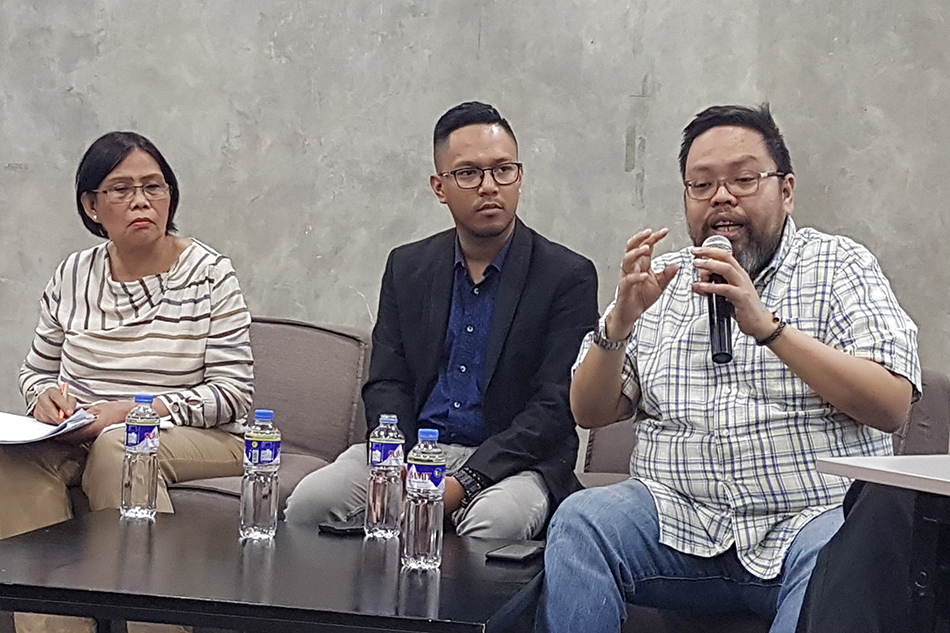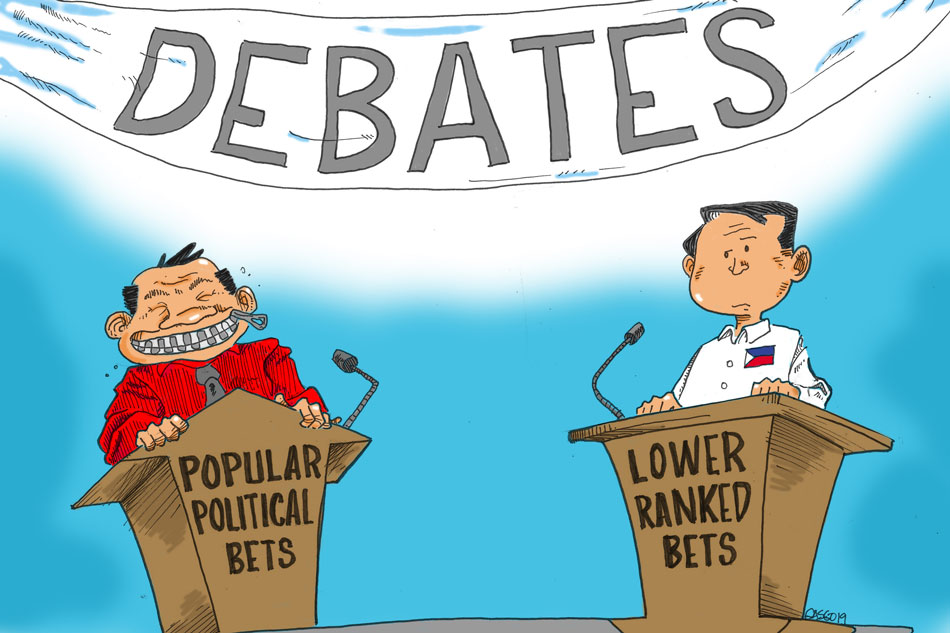Voters urged to beware of vote-buying, fake news, 'circus' campaigns | ABS-CBN

Welcome, Kapamilya! We use cookies to improve your browsing experience. Continuing to use this site means you agree to our use of cookies. Tell me more!
Voters urged to beware of vote-buying, fake news, 'circus' campaigns
Voters urged to beware of vote-buying, fake news, 'circus' campaigns
Angelica Y. Yang
Published Feb 27, 2019 05:18 PM PHT
|
Updated Feb 27, 2019 05:47 PM PHT
MANILA - Registered voters should watch out for vote-buying, online political disinformation movements, and bread-and-circus campaigns, according to an expert panel of journalists, non-sectarian organizations, and a government official from the Commission on Elections (Comelec).
Members of the panel shared their thoughts and opinions to the youth during the Asia Society Conversations: What Voters Need to Know forum which was held on February 26.
MANILA - Registered voters should watch out for vote-buying, online political disinformation movements, and bread-and-circus campaigns, according to an expert panel of journalists, non-sectarian organizations, and a government official from the Commission on Elections (Comelec).
Members of the panel shared their thoughts and opinions to the youth during the Asia Society Conversations: What Voters Need to Know forum which was held on February 26.
According to Maribel Buenaobra, executive director of the Parish Pastoral Council for Responsible Voting (PPRCV), vote-buying is a form of "cheating that happens on the ground."
According to Maribel Buenaobra, executive director of the Parish Pastoral Council for Responsible Voting (PPRCV), vote-buying is a form of "cheating that happens on the ground."
“Cheating happens [from] barangay to barangay. Candidates would spend millions, not for election lawyers or poll watchers. But they would spend millions giving money to families. And because of poverty, the families would take that. This happens before the elections, when people tell you not to vote anymore,” she said.
“Cheating happens [from] barangay to barangay. Candidates would spend millions, not for election lawyers or poll watchers. But they would spend millions giving money to families. And because of poverty, the families would take that. This happens before the elections, when people tell you not to vote anymore,” she said.
Owing to her background as a historian, Buenaobra drew an example from the past--the 2004 "Hello Garci"poll scandal during the Arroyo administration--where electoral cheating took place while the votes were being manually counted. At that time, the country’s automated election system (AES) still wasn't in place.
Owing to her background as a historian, Buenaobra drew an example from the past--the 2004 "Hello Garci"poll scandal during the Arroyo administration--where electoral cheating took place while the votes were being manually counted. At that time, the country’s automated election system (AES) still wasn't in place.
ADVERTISEMENT
The AES, which was first used during the 2010 presidential elections, ruled out the possibility for cheating taking place via the machines, Buenaobra argued.
The AES, which was first used during the 2010 presidential elections, ruled out the possibility for cheating taking place via the machines, Buenaobra argued.
Ellen Tordesillas, the president and co-founder of news website VERA Files, which also does fact-checking, agreed with Buenaobra.
Ellen Tordesillas, the president and co-founder of news website VERA Files, which also does fact-checking, agreed with Buenaobra.
“Before, the cheating was in the counting. Personally, I don’t believe those people who say that cheating still happens inside the machine. The anomaly is in the vote-buying. That’s where you’re influencing the minds of the people,” Tordesillas said.
“Before, the cheating was in the counting. Personally, I don’t believe those people who say that cheating still happens inside the machine. The anomaly is in the vote-buying. That’s where you’re influencing the minds of the people,” Tordesillas said.
Fake news
Aside from vote-buying, Tordesillas highlighted the prevalence of fake news on social media, where the youth get information from.
Aside from vote-buying, Tordesillas highlighted the prevalence of fake news on social media, where the youth get information from.
According to a VERA Files report presented by Tordesillas to the forum attendees, online disinformation in the Philippines is overwhelmingly political.
According to a VERA Files report presented by Tordesillas to the forum attendees, online disinformation in the Philippines is overwhelmingly political.
“Makers of online disinformation rely on three techniques: faking or inventing information; misleading readers by subtle manipulation of facts; and making false claims using real events,” the report said.
“Makers of online disinformation rely on three techniques: faking or inventing information; misleading readers by subtle manipulation of facts; and making false claims using real events,” the report said.
Fake news during elections is not just a problem for Filipino citizens. It is also a problem for overseas Filipino workers (OFW’s), said Buenaobra.
Fake news during elections is not just a problem for Filipino citizens. It is also a problem for overseas Filipino workers (OFW’s), said Buenaobra.
During a trip to Canada in 2017, she talked to Filipino overseas Filipino workers (OFWs) who chose their candidates for the 2016 Presidential elections, based on clickbait articles and fake news on social media.
During a trip to Canada in 2017, she talked to Filipino overseas Filipino workers (OFWs) who chose their candidates for the 2016 Presidential elections, based on clickbait articles and fake news on social media.
“They succumbed to fake news,” Buenaobra said.
“They succumbed to fake news,” Buenaobra said.
‘Like ants’
James Jimenez, director of the Comelec education and information department, said that politicians and political candidates were like ants.
James Jimenez, director of the Comelec education and information department, said that politicians and political candidates were like ants.
“Ants are motivated by their desire to survive. They have one goal and one goal only. For many of them, the biggest thing really is to win, and stay in power. In order to do that, they will adopt the easiest route always,” Jimenez said.
“Ants are motivated by their desire to survive. They have one goal and one goal only. For many of them, the biggest thing really is to win, and stay in power. In order to do that, they will adopt the easiest route always,” Jimenez said.
Two of these "easy ways" to reach their goal include: avoiding debates and parading scantily-clad dancers during campaigns.
Two of these "easy ways" to reach their goal include: avoiding debates and parading scantily-clad dancers during campaigns.
“They will avoid debates because if they say anything wrong, [their ratings] might plummet. It’s much easier to ‘sell’ a dancing, scantily-clad girl rather than a well-reasoned platform. [That’s how a candidate] gets more clicks,” he explained.
“They will avoid debates because if they say anything wrong, [their ratings] might plummet. It’s much easier to ‘sell’ a dancing, scantily-clad girl rather than a well-reasoned platform. [That’s how a candidate] gets more clicks,” he explained.
According to him, the only way voters can fix this is to "reject all the bread and circuses being thrown their way."
According to him, the only way voters can fix this is to "reject all the bread and circuses being thrown their way."
“By doing this, you will be able to bring this long-winding analogy to a close,” Jimenez said.
“By doing this, you will be able to bring this long-winding analogy to a close,” Jimenez said.
Read More:
halalan 2019
halalan top
James Jimenez
PPCRV
fake news
social media
ellen tordesillas
vote-buying
cheating
VERA Files
ADVERTISEMENT
ADVERTISEMENT






